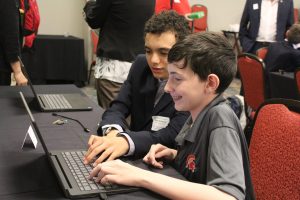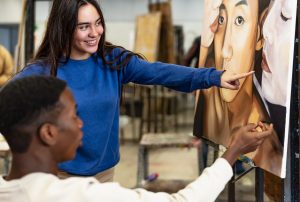CONTENT AREAS
A+ College Ready supports 40 total courses: 24 courses in grades 6-10 and 16 Advanced Placement courses. All curricular materials are housed in Canvas, and contain various templates and strategies for support. All Advanced Placement Course materials are aligned to the College Board's AP Course Exam and Description, and all 6-10 courses (11th grade in math) are aligned to the Alabama Courses of Study.
Click the content areas below to view our full course catalogue and description of each course.
COMPUTER SCIENCE
- AP Computer Science Principles
- AP Computer Science A
AP Computer Science Principles (APCSP) is an accessible introduction to the many facets of computer science designed to develop interest and broaden participation in computer science. The APCSP curriculum teaches students about algorithms, abstraction, data, the global impact of computing and computing systems and networks, as well as programming as a creative discipline. Students will learn to program in both a block-based language and a text-based language.
The A+ College Ready AP Computer Science Principles curriculum has continuously evolved to cater to the changing needs of computer science educators and students, emphasizing a student-centered, teacher-led approach. Incorporating resources from Code.org, CMU, and BJC into its originally developed in-state curriculum, it aims to deepen teachers' content knowledge in computer science, equipping them with the necessary skills and practice to teach at an Advanced Placement level. Recognizing the lack of prior computer science experience among most teachers, the course is designed to build their foundational knowledge, thereby enabling them to deliver engaging, student-centered lessons confidently. The curriculum introduces programming concepts through Snap! before advancing to Python, emphasizing the universality of computer science concepts across different programming languages and offering students the flexibility to choose the language that best suits their creative needs for the Create Performance Task. This approach not only supports teachers in mastering the content but also encourages them to evolve as computer science educators, ensuring a comprehensive learning experience for students.
The curriculum is housed in a teacher-facing Canvas course that includes daily lesson plans and all required student activities, projects, assessments, rubrics and solutions. Additionally, there is a student-facing open (no login required) course that reinforces the concepts taught by the teacher in the classroom.
APCSA is a project-based, high-level Java programming course designed for students with a strong interest in computing. The APCSA course is the equivalent of a college freshman computer science course for computer science or engineering majors.
This course features a cohesive storyline starring a group of diverse students traveling the globe, using computing tools to help solve the world's big problems. The APCSA class is put into the role of technical support for the characters in the story. Each unit begins with an engaging video to set the stage for the next project students will complete to help the characters make the world a better place with computing.
The curriculum is housed in a teacher-facing Canvas course that includes daily lesson plans and all required student activities, projects, assessments, rubrics and solutions. Additionally, there is a student-facing open (no login required) course that reinforces the concepts taught by the teacher in the classroom.
A+ College Ready supports both courses with custom curricula built to engage and empower students with numerous opportunities to design and create through computing. Curricular resources include pacing guides, vocabulary, complete lesson plans, activities, projects, assessments and all associated keys and sample solutions.
- Computer Science Endeavors (CSE) - 6th Grade
- Computer Science Discoveries – Alabama (CSD) - 7th & 8th Grade
- Computer Science and Society (CSS) - 8th Grade
- Programming Foundations - 9th & 10th Grade
The A+ College Ready Computer Science Discoveries – Alabama is an introduction to computer science for 6-8th grade students, designed with a focus on building computational thinking skills. The course covers a wide range of computer science topics such as problem solving, design, programming, web development, data, and physical computing. All of the Alabama DLCS standards are included in the year 1 curriculum that consists of 6 units covering 6 weeks each. The CS Endeavors and CS and Society curriculum consists of 4 interchangeable 9-week long units.
Programming Foundations is an engaging course designed to challenge 9th or 10th grade students who have completed the middle school Computer Science Discoveries - Alabama course, as well as build interest and excitement for the AP Computer Science Principles course. The course’s six units are designed to interest high school students and allow them to explore the possibilities of computing in their future. This course covers all the DLCS 9-12 standards and is included in the new CTE IT COS.
The curricular materials include pacing and lessons, teacher notes, unit overviews, differentiation suggestions, vocabulary, exemplary solutions, strategy templates in varied formats, and more.
- Computer Science Fundamentals and Integration







